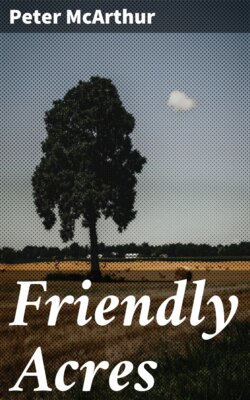Читать книгу Friendly Acres - Peter McArthur - Страница 15
На сайте Литреса книга снята с продажи.
Spring Bonfires
ОглавлениеTable of Contents
There is one spring job that is common to city, town and country and to all countries. No matter where we live, we must rake up the lawn and have a bonfire. And if we have no lawn we clean up the fire-escape and have our little blaze in the kitchen range. No matter where we live, this spring rite must be attended to. And I am inclined to think that it has been the same through all the ages since man first learned to use fire.
Come fill the cup, and in the fire of spring
Your winter garment of repentance fling;
The Bird of Time has but a little way
To flutter—and the Bird is on the Wing.
This unanimity of all men and women, and even children—for the children rake together rubbish and have their bonfires, too—must be something more than an impulse towards tidiness. It is a racial impulse, and in moments of profundity and learning I incline to connect it with the ancient rites of fire-worship. Listen to this from the Century Dictionary:
"Beltane. The first day of May (old style). An ancient Celtic festival. Bonfires were kindled on all the hills, all domestic fires having been previously extinguished, only to be relighted from the embers of the Beltane fires. This custom is supposed to derive its origin from the worship of the sun, or fire in general, which was formerly in vogue among the Celts as well as among many other heathen nations. The practice still survives in some remote localities."
Doesn't that last sentence show how blind learned men can be? I'll bet a cookie that the scholar who wrote that definition has been having his little bonfire every spring and never realized that he was as much a heathen as the people of the "remote localities" he had in mind.
When all the Beltane fires were burning in the city and country I had a heartfelt wish that I could have a mental spring cleaning-up. For lo! these many years people have been dumping their intellectual tin cans and wastepaper in my mental backyard, and I have even busied myself gathering similar rubbish, because that is the popular thing to do. If it were only possible, I would rake it into a pile and burn all of it that would burn, and then dig a hole and bury the rest. I feel as if my mind were cluttered up with stuff that is as useless as what we raked from the lawn. On these fine spring mornings it seems to me that a man should be able to get as much from an hour on the south side of the strawstack or from the doorstep where he could sit in the sun and be sheltered from the wind as from a course in college. Now is the time to enjoy Bliss Carman at his best. I have probably quoted this before, but no matter. I feel like making a vow to quote it every spring:
Let me taste the old immortal
Indolence of life once more;
Not recalling, nor forseeing,
Let the great slow joys of being
Well my heart through as of yore!
Let me taste the old immortal
Indolence of life once more!
To realize that stanza fully is to have more than you can get from all the books and all the colleges. It puts us in harmony with the universe. After loafing for an hour or so in the proper environment with these wonderful rhythms beating in my brain I feel that I should like to hark back to an earlier age and face life as lightly equipped mentally and physically as Nimrod, who was "a mighty hunter before the Lord." At such times I feel that we have had something too much of employing our time profitably and that it would be healthy for us to have occasional hours of profitable idleness.
